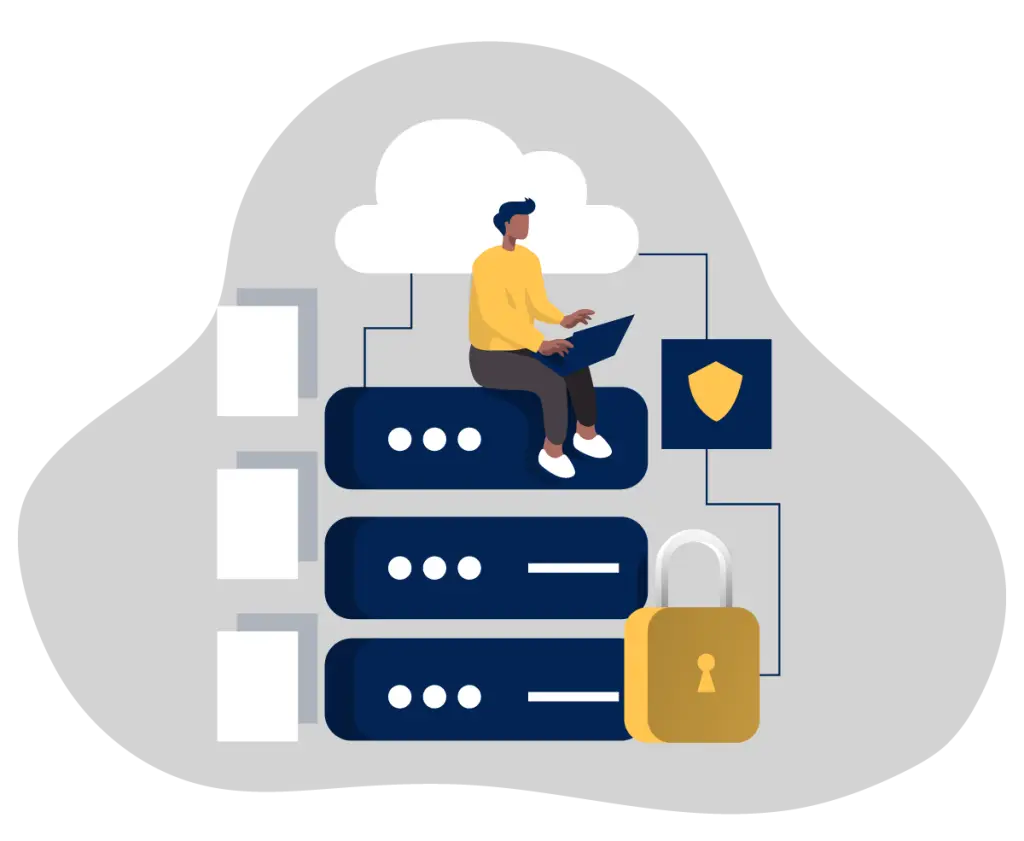This series explores three CLIC graduates turned Technical Advisors (TAs), whose experience in the CLIC program contributed to their approach to mentorship and passion for developing budding cybersecurity professionals.
Technical Advisors featured: (Left) Victoria Distrito, (middle) Basma Alhussaini, (right) Joy Jorgoni.
Basma Alhussaini
Basma is a graduate of the Catalyst’s CLIC program. Her expertise is in networking and OS security, vulnerability management, attacks and mitigations, defense in depth, monitoring, detection, and incident response. Currently, Basma works as a Cyber Security Advisor at Rogers Communications.
1. How did the former Catalyst course, Accelerated Cybersecurity Training Program, in which you were a part of a few years ago help shape your interest in becoming a CLIC Technical Advisor (TA)?
ACTP laid the groundwork for my involvement with CLIC as a TA. ACTP was a fast-paced and intense program; it pushed me out of my comfort zone, gave us a strong foundation in cybersecurity but most importantly, it gave us a sense of community and mission.
So when the opportunity came up to support others going through a similar journey with CLIC, it just felt natural. I understand the value of building resilience, the pressure of certification paths, and the importance of building community in cyber.
ACTP didn’t just shape my mentorship involvement. It made it personal.
2. What makes CLIC a unique opportunity?
What sets CLIC apart is the emphasis on collaboration and mentorship. You’re surrounded by a community of peers, mentors, and professionals who are genuinely invested in your growth. The environment is supportive but challenging — it pushes you to think critically, speak confidently, and apply your skills in ways that actually make an impact.
Whether you’re pivoting into cybersecurity or leveling up in your current role, CLIC helps you see where your unique strengths fit in the bigger picture of cybersecurity leadership.
3. Who would benefit most from the CLIC program?
- Aspiring cybersecurity professionals who want to build their voice, confidence, and presence in the field.
- Career shifters with transferable skills (like project management, communications, or law) looking to carve out a meaningful space in cybersecurity.
- Technical professionals who want to understand the governance, risk, and business side of security, and learn how to communicate effectively with non-technical stakeholders.
4. What are the key learning objectives of the program?
The key learning objectives of CLIC would focus around helping participants grow into confident, well-rounded professionals who can lead, communicate, and drive change in the cybersecurity space by providing them with a solid foundation on the components of what to protect and how to protect those assets.
5. What is the role of a Technical Advisor, and how do you support CLIC students?
We focus our TA role on offering support and guidance to learners as they transition into cybersecurity. That support includes:
- Hosting weekly study sessions with students to address course related questions submitted by them.
- Provide one on one support as needed, sharing career advice, offering study tips and time management strategies.
- Working collaboratively with other TAs in order to develop better learning plans.
6. How does industry exposure and mentorship set CLIC grads apart?
By providing participants with real-world insights and guidance from experienced professionals. This direct connection helps students understand current cybersecurity challenges, build practical skills, and expand their professional networks — all of which accelerate their growth and confidence in a new field. Unlike typical training programs, the mentorship component offers personalized support, making the transition smoother and more effective. Mentorship also provides the following:
- Honest insight into career paths, pitfalls, and growth strategies
- Encouragement from mentors who’ve walked the same path
- A safe space to ask questions, test ideas, and build confidence
7. What are some of the most common pathways for grads and how does CLIC equip them to excel in the field?
CLIC graduates come from a variety of backgrounds and move into a wide range of cybersecurity roles, but what ties them together is a strong foundation in cybersecurity. Some of the roles grads can have include: cybersecurity advisor, privacy consultant, cybersecurity analyst, GRC specialist, and technical project manager.
Joy Jorgoni
Joy is a graduate of the Catalyst’s CLIC program. She is a strategic cybersecurity analyst with a five-year track record of securing sensitive medical data and adhering to provincial data privacy laws, resulting in zero breaches of data loss incidents during her tenure. Joy currently works as a Security Analyst at York University.
1. How did the former Catalyst course, Accelerated Cybersecurity Training Program, in which you were a part of a few years ago help shape your interest in becoming a CLIC Technical Advisor (TA)?
My experience as a student in the ACTP program enabled me to be highly effective in my role as a TA. Having gone through a similar program myself, I was able to use my own experience as a student to curate my weekly TA sessions to be more effective. Additionally, I employed techniques that were successfully used by my previous TA (i.e. creating weekly quizzes) to help deliver high-impact sessions; I was also able to identify which topics to spend more time discussing versus topics that were easier for students to understand.
2. What makes CLIC a unique opportunity?
CLIC is a unique opportunity as it allows students from diverse industry backgrounds to learn cybersecurity and be able to combine it with their previous experience to elevate their careers. It’s one of the best accelerated training programs in Canada and I think not enough people know about it!
3. Who would benefit most from the CLIC program?
I think people who are career-changers or from non-technical backgrounds would benefit the most from the CLIC program. Most people may think you need a technical background to succeed in cybersecurity — this couldn’t be further from the truth. I think there are many transferable skills that people from non-technical backgrounds bring, which are crucial in cybersecurity (i.e., communication skills, presentation, teaching, etc.) By taking the CLIC program, these people can build those foundational technical skills and combine them with their previous experience to break into the field of cybersecurity and fill the growing demand for new professionals.
4. What are the key learning objectives of the program?
- Develop foundational knowledge of cybersecurity and its principles
- Learn about new and emerging threats, attack vectors, vulnerabilities, and exploits
- Achieve (2) industry-leading certifications from SANS (GFACT, GSEC)
- Strengthen communication skills and build a professional network
- Gain an understanding of the current cybersecurity landscape and the cyber roles in demand to be able to transition into a new career in cybersecurity
5. What is the role of a Technical Advisor, and how do you support CLIC students?
As a TA, my main responsibility was to support students’ understanding of course material and help them stay on track with their study program and learning goals in order to be successful in their SANS certification exams. I led weekly sessions where we reviewed chapters from the course, clarified any difficult concepts, and discussed study challenges. I also created interactive weekly quizzes for students that we would do together during the sessions, serving both as a reinforcement tool and a way to assess students’ understanding in a group setting. At the end of each call, I also opened up a Q&A session where students had the opportunity to ask any questions about course content, labs, quiz questions, exam preparation, etc.
6. How does industry exposure and mentorship set CLIC grads apart?
The industry exposure is a game changer for CLIC grads. It allows them to quickly bridge the gap between the high-quality education they receive throughout the program and the opportunity to connect with professionals already working in the industry. By connecting new grads with industry professionals, you help them build up their network, meet people who can help them gain a foothold in the industry, and open doors they may not otherwise have even known existed. In my experience, ACTP connected me with a mentor I still have today through one of the pre-planned coffee chats; this was fundamental to me later receiving a job offer from a mutual connection. I can’t understate how valuable I think the hands-on mentorship and industry exposure provided to CLIC grads is for their professional development!
7. What are some of the most common pathways for grads and how does CLIC equip them to excel in the field?
One of the most common entry points for CLIC grads into the field is through the role of a Cybersecurity Analyst, SOC Analyst, GRC Analyst and other analysis-focused junior roles. This role demands both foundational knowledge of the technical aspects of cybersecurity, strong problem solving skills, and the ability to think quickly and critically in high-stress situations. By completing the two SANS certifications in the CLIC program, students will have enough technical knowledge to get their foot in the door. They will refine and broaden their technical skills with more experience. The hands-on labs are invaluable as grads can expect to use a lot of the same tools and protocols in their day to day work. Furthermore, Closer to the end of the CLIC program, students participate in a career-preparation program that helps prepare them for job applications, interviews, and for starting a new role. This is key for equipping new grads with both the soft-skills and confidence to step into the field and take on new opportunities.
Victoria Distrito
Victoria is a graduate of the Catalyst’s CLIC training program. As a seasoned Cybersecurity Analyst with a passion for digital defense, Victoria thrives on the front lines of network and cloud security. She works as a Security Analyst at ORION Ontario’s Research and Education Network and is a GIAC Advisory Board Member. Victoria holds her GIAC (SANS) certifications, Python Coder, GCIH, GSEC, GFACT, and hands-on experience in threat-hunting.
1. How did the former Catalyst course, Accelerated Cybersecurity Training Program, in which you were a part of a few years ago help shape your interest in becoming a CLIC Technical Advisor (TA)?
Transitioning my career into cybersecurity was not easy. I went through a lot of self-doubt, fatigue, and stress, but being in the ACTP program provided me with the support to cope through these challenges. I cannot undermine the impact of having someone who was once in my shoes and understood exactly what I was going through, which has helped me. I would say my success in cybersecurity was a team effort, so it feels right for me to provide this kind of support to others on the path I once was and hopefully help them succeed.
2. What makes CLIC a unique opportunity?
The support provided by CLIC has been exceptional from the outset. The staff demonstrated a genuine commitment to my success, ensuring that I felt recognized and that my efforts were appreciated. I received valuable guidance in balancing my life, career, and academic responsibilities. Most importantly, CLIC facilitated meaningful connections with various employers, greatly enhancing my professional opportunities.
3. Who would benefit most from the CLIC program?
CLIC is an excellent fit for individuals who feel their current career or life situation has reached a standstill, yet still sense they are destined for something greater and are ready to embrace new challenges.
4. What are the key learning objectives of the program?
Technical:
- Concise background on computers and networking
- Introduction to computer programming
- Primer to multiple avenues in cybersecurity (Red, blue, purple teams, different types of attacks; GRC, incident response, cloud, etc.)
Non-technical:
- Encourages accountability, leadership, and time management
- Promotes continuous learning and discovery — CLIC is just the start of the journey.
- Promote team collaboration
- Enhances communication and professional presentation
- Professional help in navigating current career trends
5. What is the role of a Technical Advisor, and how do you support CLIC students?
More than answering technical questions, the most important part of being a TA was sharing my experiences of going through the same program. Validating that the hardships and confusions they were going through were part of the process and how to navigate that process. Sharing what worked out, tips, suggestions and my lessons learned. And most of all, making them feel heard and offering words of encouragement.
6. How does industry exposure and mentorship set CLIC grads apart?
It gives them realistic expectations of what’s out there. Having a taste of different tools, and job responsibilities helps in trying to find a niche in cybersecurity and how to prepare to get into that role in terms of skills and strategies needed to pursue after the CLIC program. It’s good to emphasize that there is a job for everyone under the vast cybersecurity domains and that each one should be an ally and not a competition, however, still giving a realistic view that you will definitely reap what you sow in this program.
7. What are some of the most common pathways for grads and how does CLIC equip them to excel in the field?
General Security Analyst roles, GRC entry level roles. SOC I or SOC II roles in Managed Service Providers. And depending on your previous background, I’ve seen people with IT backgrounds achieve roles as Security Engineers.







